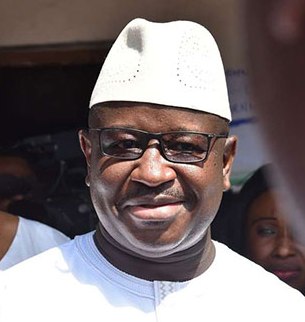The making of a new constitution: suggestions for the committee of 80
Introduction – After more than 20 years in existence, the 1991 constitution of Sierra Leone is in the process of being reviewed. Coming into force the same year that civil war broke out in the country, the constitution was an attempt to break free from a past characterised by tyranny and corruption on an unprecedented scale.
Calls to revise the 1991 constitution became louder after the Truth and Reconciliation Commission, one of the post-war transitional justice mechanisms, made recommendations for its review.
In 2013, the government established a mega committee of reviewers drawn from a wide range of constituencies. The committee will collect views from the public, examine constitutions and constitutional best practices from other places and come up with a new draft that would strengthen democracy and reflect the views and aspirations of the citizens. While many agree that the review is necessary, some have criticized the setting up of a parallel ‘law reform’ institution instead of working through the existing one.
Sierra Leone already has a Law Reform Commission (LRC) whose mandate by law is to keep under review all the laws of Sierra Leone, statutory or otherwise for the purpose of their reform, development, and codification. In fact, several years ago, the LRC completed a review of the constitution and submitted a report and draft constitution to the President. Why the government chose to bypass the LRC now is anyone’s guess.
The committee has not got off to a lightning start, perhaps because of its unwieldy size and has recently been hit by a high profile resignation. It has two years to complete its mandate and already there are concerns that it may overshoot that deadline.
Crafting a better constitution
As the review process unfolds, public discussions about the nature and substance of the new constitution will gain momentum. Already, some are arguing for a Swiss-style con-federal system to replace the current winner-takes-all system, which many believe has become dangerously tribalised. Others, depending on their persuasion are rooting for reduced or increased powers for the executive.
The review process is not expected to bring any volte-face in our constitutional tradition. Since 1961, a particular constitutional template has been used and a new constitution would largely follow that tradition. It will contain provisions that; delimit the powers, functions and composition of the various arms of government and other important state institutions; protect fundamental rights and freedoms including electoral rights; identify the various sources of law and set out the inevitable supremacy clause that makes a constitution much more than an ordinary statute.
The 1991 constitution is by no means a bad law. However, with the benefit of hindsight and a lot of trial and error, there are several suggestions that one could make to ensure that its successor is better and addresses the current realities of our nation. The following are some ideas for a better supreme law.
1. Eliminate fundamental principles of state policy
This chapter is perhaps the most redundant in the current constitution. Of what use are provisions in a constitution that are not capable of being enforced? These ‘feel good’ objectives have helped to undermine the realisation of economic, social and cultural rights in Sierra Leone and created the false notion that such rights are not capable of enforcement. The committee should not reproduce this fundamental flaw in the new constitution.
2. Protect the whole spectrum of human rights
The 1991 constitution only recognises and protects civil and political rights. However, Sierra Leone is a party to the Covenant on Economic, Social and Cultural Rights 1966 and various regional and sub-regional human rights instruments which require legislative recognition and protection of the rights to food, education, healthcare, water, work, among others. The highest form of rights protection within a state is a constitutional one. Kenya and South Africa, countries regarded as having very progressive constitutions, protect economic, social and cultural rights. The new constitution should comply with the full range of Sierra Leone’s international rights obligations.
3. Remove the constitutional monopoly of the supreme court
The current constitution gives the Supreme Court a monopoly over the interpretation or enforcement of the constitution. Over the past 20 years there have been very few interpretations or enforcement of the constitution by this court. Invariably, that has affected the development of our constitutional jurisprudence. In South Africa and Kenya constitutional challenges can be made at the level of the high court. Such cases then work their way through to the highest court of the land. This approach has two distinct advantages. First, it provides the assurance of an appellate process for dissatisfied litigants, which the current system does not. Second, high courts are much more familiar terrains for litigants and lawyers than Supreme Courts. Constitutional matters could more easily be lodged and prosecuted in the high court.
4. Protect important bodies such as the Anti-Corruption Commission and the Human Rights Commission
Corruption and rights abuses have been the bane of many African countries including ours. In many instances, the two have been strongly linked. Corruption results in the non-fulfilment of economic social and cultural rights which require resources. Corrupt wealth could also be used to suppress civil and political rights. Rights commissions and anti-corruption bodies are critical to ensure accountability of power holders. However, they are also often targets of powerful political interests. The recent attempt by a private member’s bill to water down some aspects of the anti-corruption legislation shows how susceptible such bodies could be to political interference. Both institutions should be entrenched in the new constitution with enhanced powers, particularly for the rights commission.
5. Recognise that sovereignty and ownership of land and natural resources vest in the people
The constitution, under the unenforceable chapter II declares that ‘sovereignty belongs to the people of Sierra Leone from whom Government through this constitution derives all its power, authority and legitimacy’. It strikes one as odd that such an important provision- perhaps the most important- is located in this chapter. In view of the increasing trend of large-scale land acquisition for mining and agribusiness and to correct the wrong assumption that government ‘owns’ everything, the new constitution should categorically recognise and state that sovereignty, land and natural resources belong to the people of Sierra Leone.
6. Strengthen the supremacy of the constitution
Section 171(15) of the 1991 constitution stipulates that the constitution is the supreme law of the land and that any other law found to be inconsistent with its provisions is accordingly void. This provision sets the constitution apart from ordinary statutes. It is the standard against which all other laws are measured. However, if the standard is inconsistent, it becomes an unreliable measuring tool. The present constitution’s supremacy is clearly undermined by the express subjugation of some of its provisions to customary law. The latter is unwritten and lacks interpretational discipline and aspects of local customs have been discriminatory against women. Section 76 of the Courts Act 1965 provided some measure of control by stating that any customary law that was ‘repugnant to natural justice, equity and good conscience’ or any statute applying in the provinces should not be observed or enforced. The new constitution should go a step further. It must ensure that rules of customary law comply fully with its provisions or risk being nullified. In addition, policy and practice should also be measured against its provisions for consistency.
Conclusion
The UN has recognised that both process and substance are important for success in constitution-making. A clean and engaging process confers legitimacy and good substance can have deep positive impacts on a nation. The above suggestions are by no means exhaustive and the committee is expected to collect and distil a range of views from the public. The process we have embarked upon is an opportunity to create a common vision of the future we want for ourselves and our children. The responsibility lies on everyone to help make our collective future better.
By Sonkita Conteh, Director, Namati, Sierra Leone
Stay with Sierra Express Media, for your trusted place in news!
© 2014, https:. All rights reserved.





